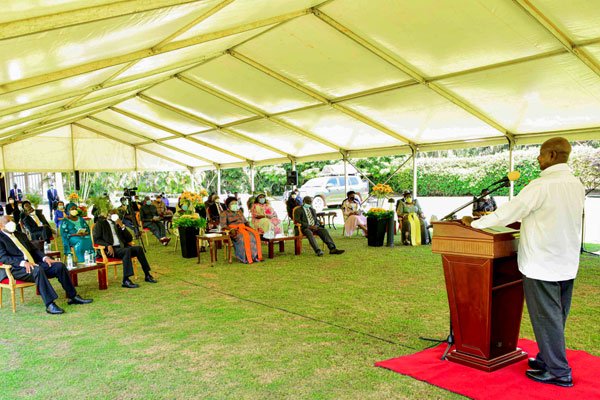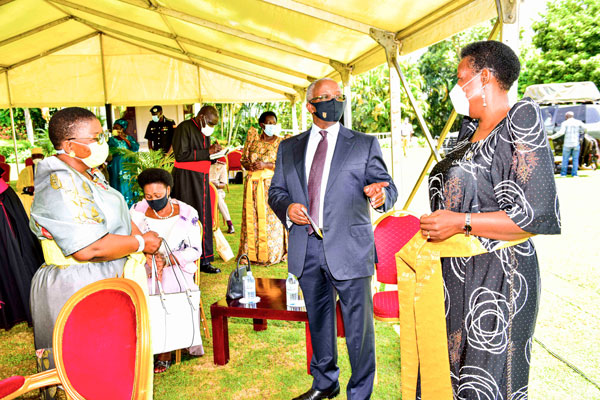We want reconciliation with Opposition, says Museveni

President Museveni delivers his speech during the 35th anniversary of the National Resistance Army (NRA) Liberation Day at State House in Entebbe on January 26, 2021. PHOTO/PPU
What you need to know:
- Mr Museveni, who has been advocating the East African and African Federation, warned that the current generation of leaders on the continent are likely to lead to the collapse of Pan-Africanism, should they not change their ideology.
- The NRM government has consistently organised elections under the 1995 Constitution.
President Museveni has repeated his earlier call for reconciliation with the Opposition saying the National Resistance Movement (NRM) party has in the past incorporated that kind of arrangement.
Mr Museveni, who on January 14 won a sixth elective term in office, was speaking during the 35th anniversary of the National Resistance Army (NRA) victory at State House, Entebbe, yesterday.
While responding to comments made by Rt Rev Msgr Charles Kasibante, the Vicar General of Kampala Archdiocese, who led the opening prayer at yesterday’s ceremony, Mr Museveni said he is ready to reconcile with anyone who fronts an ideology that is different from that of the NRM.
“On the issue of reconciliation which Msgr Kasibante talked about…that is our way to do things. That is how you find that Idi Amin’s son is my deputy Director of Intelligence and when you see Taban, you can see that Idi Amin is around,” Mr Museveni said.
Earlier in his speech, he recounted how he fought former President Amin.
The President went on to list State Minister for Foreign Affairs, Mr Henry Oryem Okello, the son to former President Tito Okello, Kibanda North MP Tampo Idi Amin, the grandson of Idi Amin, and Lands minister Betty Amongi, the daughter-in-law of Milton Obote, as fruits of reconciliation championed by NRM.
“So really for us we do not have much problems (with reconciliation). We have the mouth and we use it to talk. The only thing we shall not tolerate is violence. This is the minimum. Violence, intimidation and cheating are not allowed. Let everybody maintain peace, everything will move in a positive direction,” Mr Museveni said.
Uganda has just completed the Presidential elections, in which campaigns by Opposistion candidates Robert Kyagulanyi, alias Bobi Wine, of the National Unity Platform party and Forum for Democratic Change candidate Patrick Oboi Amuriat, met violence by security forces.
At least 54 people were killed by security forces in November 2020 after spontaneous protests broke out as a result of the arrest of Bobi Wine.
Bobi Wine, who came second in the presidential elections, was put under house arrest for nearly two weeks, until Court ordered the police and the army to vacate his private home in Magere, Wakiso District, on Monday.
Present at the function was former Prime Minister Amama Mbabazi and his wife Jacqueline Mbabazi, who are slowly returning to the NRM fold after Mr Mbabazi’s unsuccessful shot at the presidency in 2016.
Future of Africa
Mr Museveni, who has been advocating the East African and African Federation, warned that the current generation of leaders on the continent are likely to lead to the collapse of Pan-Africanism, should they not change their ideology.
He said the best way for Africa to develop one big market for its products is to unite and integrate as the British colonies of North America did and created the powerful nation of the United States of America (USA).
“Latin America, which is very rich with water, is the centre of misery in the whole world because politically, they are badly organised. On the other hand, USA is now the powerful nation in the whole world because of uniting the British colonies. So, the question is; are the present generation of African leaders going to build- a Latin America in Africa or a United States in Africa?” he asked.
35 years of NRM
Education
According to Vision 2040, the gains made include increasing the enrolment from 2.8 million in 1996 to more than eight million at the moment.
The number of teachers and classroom blocks have also increased.
The NRM which found only Makerere as the public university, has also established a number of regional universities and technical institutions to enhance skills training.

Former Prime Minister Amama Mbabazi (2nd right) shares a light moment with National Resistance Movement (NRM) Secretary General Kasule Lumumba (left) and Minister for Presidency Esther Mbayo (right) during celebrations to mark the 35th anniversary of NRM Liberation Day at State House Entebbe on January 26, 2021.
Energy sector
By 1986, there was only one big power generation plant at the Owen Falls Dam in Jinja.
On top of renovating it, the government has constructed more than 10 power dams, and this has increased the generation of electricity, hence embarking on the rural electrification programme.
Health
Whereas the delivery of health services has remained predominantly government, the health sector has also undergone tremendous changes.
As the government increased the number of public health facilities, the sector has also been liberalised to pave way for private facilities.
On top of the Mulago National Referral Hospital, more than 10 regional referral hospitals have been established.
Demography
Life expectancy has increased from 48.13 years in 1986 to about 60 years now whereas the population has increased from 14m to an estimated 45m people currently.
President Museveni has attributed this to the massive immunisation campaigns that his government launched in 1987.
Roads infrastructure
Uganda has invested quite heavily in road infrastructure. Old roads have either been resurfaced or upgraded from gravel to tarmac.
The result has been an increase in the number of kilometres under tarmac from 1,200 in 1982 to close to 6,000km now. The government has increased the funding for roads from Shs3b in the 1990s to Shs6.4 trillion in the current budget.
Transport and communication
Government had until 1986, been the biggest player in the transport sector as it owned and operated Uganda Airlines Corporation, Uganda Transport Company and People’s Transport Company.
However, those companies were wound up on the recommendation of the World Bank and the International Monetary Fund (IMF) to stop hemorrhaging of resources. Some of the gains in that sector include:
After reviving the Uganda Airlines which now has five aircrafts, the government is working on modalities of revamping the railway transport through the construction of the Standard Gauge Railway (SGR).
Legislature
Parliament having been dissolved by the time the NRM came to power in 1986, the number of legislators has tremendously increased in what is known as effective representation.
Currently, the 10th Parliament has 445 elected MPs whereas the 11th Parliament will have 529 seats.
Democracy
The NRM government has consistently organised elections under the 1995 Constitution.
Despite allegations of rigging elections in the last five elections, President Museveni has won every election since 1996.
The process of conducting the elections by the Electoral Commission (EC) has been questioned by a number of stakeholders especially the opposition, civil society and observer missions.
One of the outstanding challenges of the 35 year NRM leadership has been the fight against corruption.
Much as the government has created several offices that include; the Inspectorate of Government (IGG) and a specialised court; the Anti-Corruption Court, the vice still remains a problem in the country.




